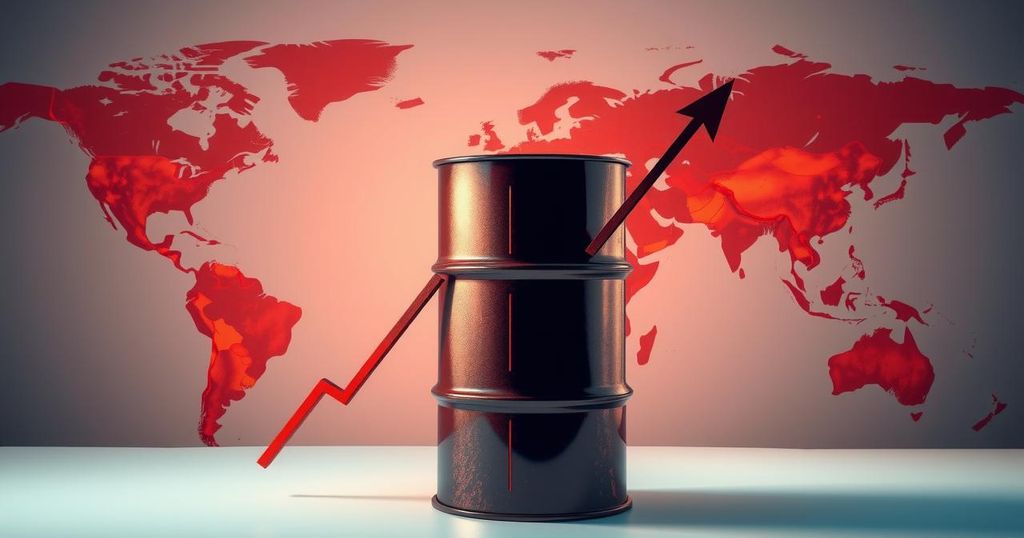Politics
ASIA, CANADA, CHINA, CRUDE OIL IMPORTS, DONALD TRUMP, EUROPE, EUROPE/ASIA, GAZA, GAZA STRIP, GLOBAL ECONOMY, GOVERNMENT, IRAN, ISRAEL, JORDAN, MEXICO, MIDDLE EAST, NORTH AMERICA, OECD, OFFSHORE DRILLING, OIL INDUSTRY, OIL PRICES, OIL PRODUCTION, PALESTINIAN MINISTRY OF HEALTH, PHILIPPINES, RED SEA, REUTERS, RUSSIA, TRUMP, U. S, U. S. WEST TEXAS, UKRAINE, VLADIMIR PUTIN, YEMEN
Leila Ramsay
0 Comments
Oil Prices Increase Amid Global Tensions and Economic Stimulus Plans
Oil prices rose due to Middle East tensions and China’s economic stimulus plans, despite concerns over global growth and tariffs. Brent crude and WTI futures increased, supported by U.S. airstrikes in Yemen and strong retail sales data in China. Market participants are anticipating negotiations between U.S. and Russian leaders regarding Ukraine, which could affect future oil supply and prices.
On Tuesday, oil prices experienced an increase, primarily driven by escalating tensions in the Middle East and China’s initiatives to stimulate its economy. This growth was tempered by worries regarding global economic stability, U.S. tariffs, and ambiguous ceasefire negotiations in Ukraine.
Brent crude futures climbed by $0.36 (0.5%) to reach $71.43 per barrel, while U.S. West Texas Intermediate crude futures rose by $0.32 (0.5%) to $67.90.
According to analysts at ING, various factors contributed to this rise, including U.S. airstrikes targeting Houthi locations in Yemen and China’s measures aimed at enhancing domestic consumption, such as income increases and childcare subsidies announced on Sunday.
Recent economic data indicated a notable strong retail sales growth for January and February, despite a downturn in industrial production and rising urban unemployment that reached a two-year peak. In China, refinery consumption, bolstered by new refinery operations and heightened demand during the Lunar New Year, saw a 2.1% increase compared to the prior year.
U.S. President Donald Trump threatened continued attacks on Houthis if aggressive actions against maritime vessels in the Red Sea persist, attributing responsibility for further assaults to Iran. Additionally, the Israeli-Palestinian conflict intensified as Israel launched airstrikes on Gaza, resulting in significant fatalities, ending a temporary ceasefire.
The OECD pointed out that Trump’s tariffs may adversely impact economic growth in the U.S., Canada, and Mexico, potentially decreasing global energy demand. Venezuelan oil company PDVSA expressed intentions to sustain production and oil exports in collaboration with Chevron, despite an impending expiration of its U.S. license next month.
Market participants are closely observing impending discussions between Trump and Russian President Vladimir Putin concerning the Ukraine conflict, anticipating that a peace resolution could lead to eased sanctions on Russia, enabling its oil supply to re-enter the global markets and possibly reducing prices.
In summary, the rise in oil prices is attributed to a combination of Middle Eastern tensions and China’s economic stimulus efforts. While positive economic data and increasing consumption in China provided support, ongoing geopolitical strife, the impact of U.S. tariffs, and uncertainties surrounding Ukraine negotiations are key factors influencing the market. Observers continue to watch the developments closely, especially regarding potential negotiations that could reshape global oil supply dynamics.
Original Source: www.jordannews.jo




Post Comment